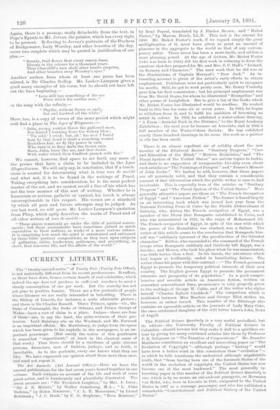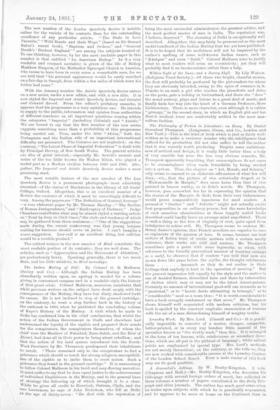The Political Science Quarterly is a very useful periodical, but
its editors—the University Faculty of Political Science in Columbia—should beware lest they make it dull to a spiritless ex- tent by giving too many continued articles like those by Professor E. R. Seligman on "The Taxation of Corporations." Mr. Brander Matthews contributes an excellent and interesting paper on "The Evolution of Copyright "—although perhaps " history " would have been a better word in this onnection than "evolution "- in which he tells Americans the undoubted although unpalatable truth, that "from having been one of the foremost States of the world in the evolution of copyright, the United States has now become one of the most backward." The most generally in- teresting paper in this number of the Political Science Quarterly is one, which is by no means an out-and-out panegyric, on Hermann von Hoist, who, born in Livonia in 1841, emigrated to the United States in 1867 as a steerage passenger, and who has published a remarkable "Constitutional and Political History of the United States." The new number of the London Quarterly Review is notable rather for the variety of its contents than for the outstanding excellence of any particular article. "The State in Loco Parentis," "Wild Beasts and their Ways" (based on Sir Samuel Baker's recent book), "Baptism and Orders," and "General Booth's Darkest England '" are among the subjects treated of. To our thinking, however, by far the most readable paper in this number is that entitled "An American Bishop." In it a very readable and compact narrative is given of the life of Bishop Matthew Simpson, of the Methodist Episcopal Church in America, who seems to have been in every sense a remarkable man, for we are told that "his personal appearance would be easily matched on a fair-day in Omagh, from within a few miles of which town his father had come."
With the January number the Asiatic QuarterLy Review enters on a new series, under a new editor, and with a new title. It is now styled the Imperial and Asiatic Quarterly Review, and Oriental and Colonial Record. From the editor's prefatory remarks, it appears that his programme is a very ambitious ono. He intends to supply to the public, information and opinion from authorities of different countries on all important questions coming within the categories "Imperial" (including Colonial) and "Asiatic." We are bound to say that the first number of the new series suggests something more than a probability of this programme being carried out. Thus, under the title "Africa." both the Portuguese and the Italian side of an important international difficulty are presented. The Colonies are not neglected ; on the contrary, "The Latest Phase of Imperial Federation" is dealt with by Principal Hervey, of New South Wales. The general articles are also of great interest, —especially Mr. Sewell's memoir and notes of the too little known Sir Walter Elliot, who played a useful part as a Madras civilian between 1820 and 18(30. Alto- gather, The Imperial and Asiatic Quarteriy Review snakes a most promising start.
The most notable feature of the new number of The Law Quarterly Review is a permanent photograph—moat admirably executed—of the statue of Blackstone in the library of All Souls' College, Oxford. Altogether, this is an excellent number of a Review the contents of which it must be exceedingly difficult to vary. Among the papers are "The Definition of General Average " —a very elaborate paper by Mr. Thomas Barclay—" The Decline of Roman Jurisprudence," and "Bankruptcy of Partners." Judge Chambers contributes what may be almost styled a tattling article -cm " Trial by Jury in Civil Cases," the style and tendency of which may be gathered from these sentences :—" One of the suggestions made during the recent controversy was that young lawyers waiting for business should serve on juries. I can't imagine a worse suggestion. Law-calf is an excellent thing, but calf-law would be a terrible product."
The critical notices in the new number of Mind constitute the most readable portion of its contents ; they are well done. The articles, such as "Apperception and the Movement of Attention," are portentously heavy. Speaking generally, there is too much Bain, and too little antidote, in Mind nowadays.







































 Previous page
Previous page